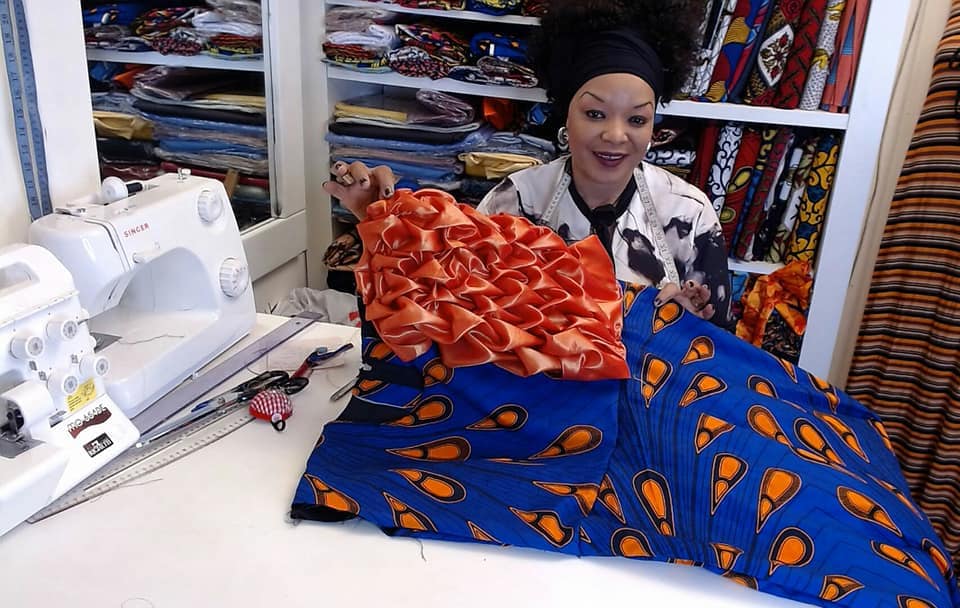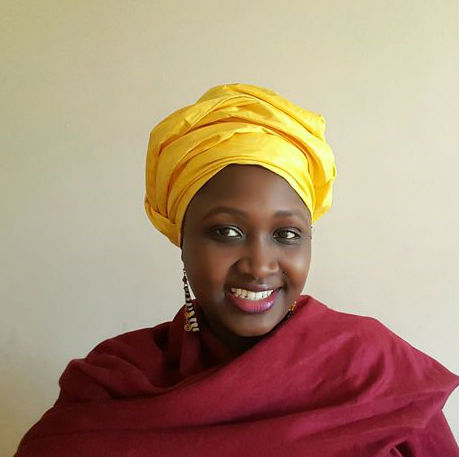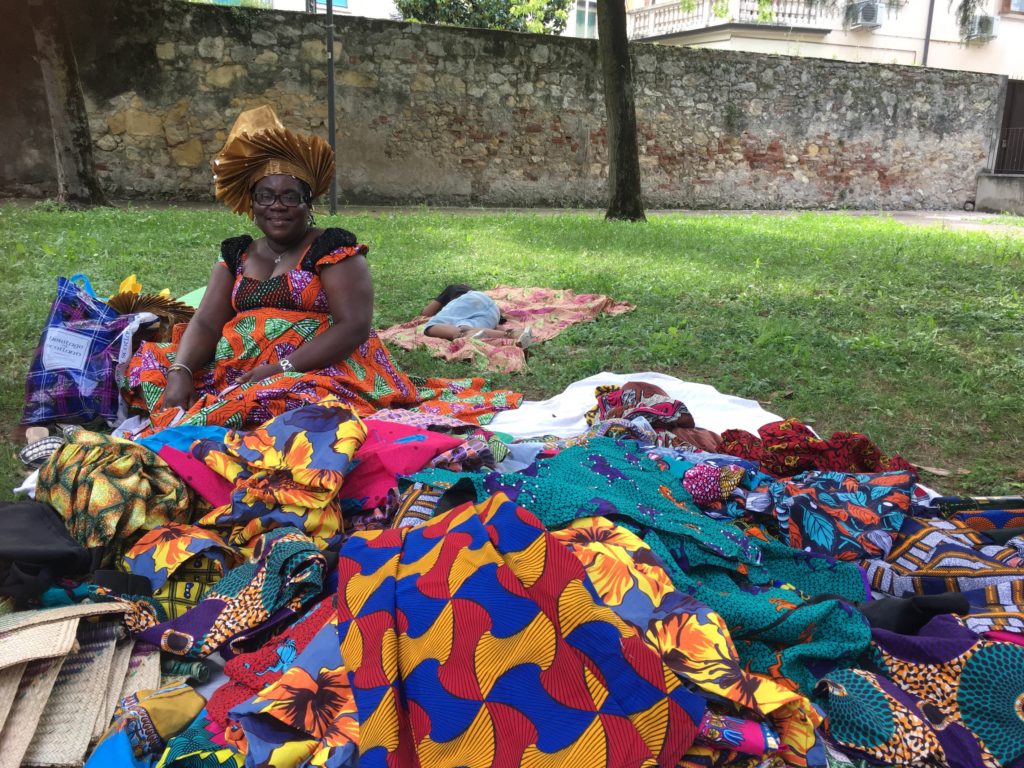How a cookery group helps BME and migrant women+ to build friendships, learn from each other’s cultures and overcome adversities from the hostile immigration policies.
By Laura Ndanuko
Moving to a new country and living in a new area can be scary and lonely, with long – and sometimes sad – days.
While awaiting Home Office decisions, people seeking asylum face many negative experiences. These include being stripped of rights, not being allowed to work, and not feeling part of the society they now live in. This can have adverse effects on their mental health and well-being.
The Mental Health Foundation found that “asylum seekers are five times more likely to have mental health needs than the general population, and more than 61% will experience serious mental distress”. Despite this, statistics also show that this group is much less likely to receive support from mental health services than the general UK population.
Worldwide, women and girls comprise around 40 per cent of asylum seekers. They have fled from war, persecution and gender-based violence. In 2020, three in ten people who applied for asylum in the UK were women and girls.
Migrant Women Press investigation found the vast impact of migration and displacement on women’s mental health.

In my experience, things started to change when, due to my deteriorating mental health, my GP referred me to a community link worker. In a matter of days, the link worker sent me an email with information about community activities ranging from choirs, singing groups, gardening projects, sewing classes and crafts.
While looking at the long list, I did not only have to consider distance but if I could afford the bus fare too. If the commute seemed complicated, I chose not to go.
I was so excited to learn about Kairos Women+. It was only a ten-minute walk from my place. After looking through their website, I called to register with them.
The phone call was a warm hug; I could already feel the positive energy from that interaction.
When I visited the space, I was introduced to different activities and on that day, some participants were planning a new cookery class.
I was right on time for Kairos Kitchen, a recipe-sharing group for Black, Asian and Minority Ethnic women+.
That was the first step to a journey of confidence, friendship, new skills and happiness.


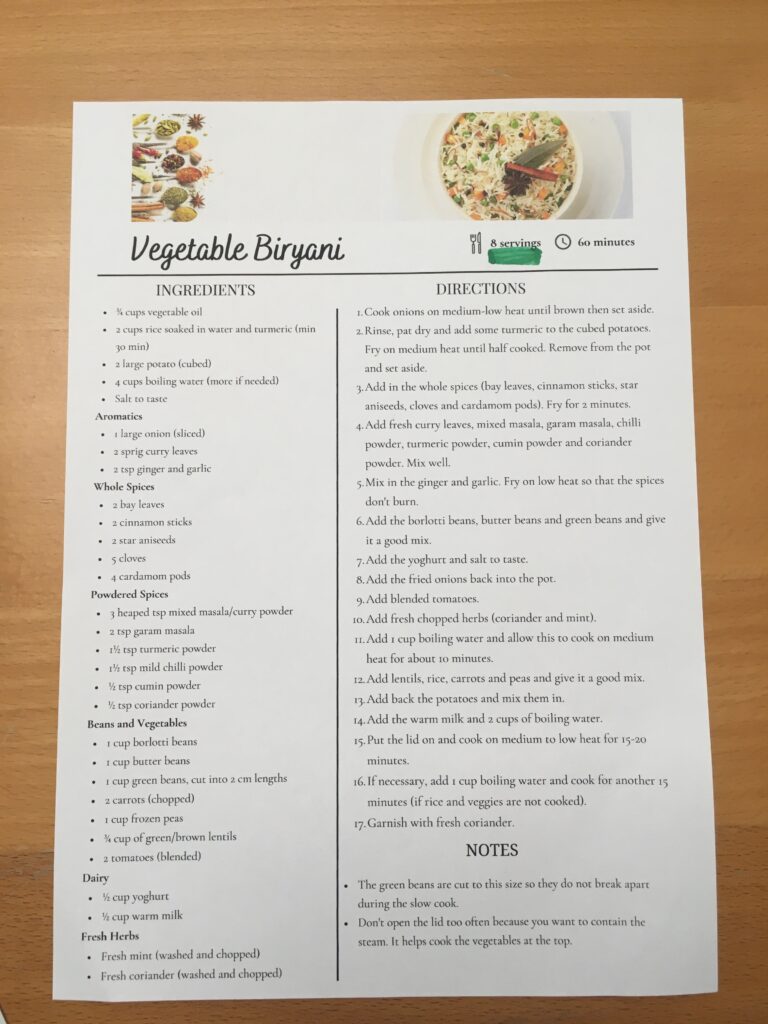
“Kairo’s feels like a second home for many members that come here and instantly feel welcomed.”
Annie Tothill
A second home for community members
Kairos Women+ is a community-led women’s space based in Paisley, Renfrewshire. It provides a safe space for women and non-binary people, creating opportunities through workshops, events, training and courses.
“Kairo’s feels like a second home for many members that come here and instantly feel welcomed. We are trying to build a community that’s different from other typical services and breaking down the “service user and service provider” dynamics by building strong relationships and letting people lead themselves, lead the activities to gain skills and confidence.” Explained Annie Tothill, Project Manager.
Annie has seen the cookery project come up from an idea when she joined Kairos in 2019 to its current form.
It all started before the COVID-19 pandemic. Despite all the efforts to initiate the project, looking for a kitchen space since the previous premises did not have one, in the week planned to start, the pandemic hit, and there was a lockdown. Annie and the participants did not give up but shared recipes and videos of them cooking at home, documented on social media and the first Kairos’s Kitchen recipe book.
“We felt that previously Kairos was not engaging with as many diverse backgrounds as it could…”, said Annie about the current group, focused on BME women+.
Kairos is working to engage with ethnically diverse women and involve them in their activities, and Kairos Kitchen is one of these initiatives.

“People of colour have a strong connection with food.”
Thaveshni Pillay
More than a cookery group, a safe space for BME and migrant women+
Every Thursday, for a 10-12 week block, Kairos Kitchen members take turns learning from each other.
The participants are women from Kenya, Tanzania, South Africa, and Nigeria. They also have staff members and volunteers who bring us their recipes from Mexico, the Philippines, India and Scotland.
A self-nominated participant suggests a recipe, and the staff member in charge organises how to get the ingredients and puts the recipe together, ready for the next session.
Once we arrived, we shared how our weekends were and started preparing food and cooking.
The person sharing the recipe has their cooking station where she instructs us as we go through the recipe step by step. As the food simmers, we listen and dance to a great music playlist created over time from our backgrounds.
We chat away and work seamlessly to tidy up the kitchen, set the table and finally sit down for a feast. Going home becomes trouble since we are mostly overfeeding!
It starts with learning how to elevate a tin of baked beans from the cupboard to a delicious curry with little work. The small group has grown in work ethic and even started catering for community events.

“I feel good. I feel like I’m with my family.”
Samira Rashid
“ People of colour have a strong connection with food.”, explained Thaveshni Pillay, Kairos Kitchen Community Food Worker.
“As much as we come from different countries, culturally, there are so many similarities; when we started to say how we all grew up, how our grannies cooked outside, using fire, slashed the chicken… Just sharing the stories with someone with having the same experiences is comforting. It’s nostalgic. It makes me less homesick.”
Thaveshni is originally from South Africa. Although she doesn’t have to face the asylum process, as she is married to a British citizen, she needs to go through all the bureaucracy of the visa process. She understands her experience is different, but she relates to asylum seekers’ stress and anxiety and supports them.
She joined Kairos at a time in her life when she needed a place to integrate into the community. She then became a volunteer and later took over the leadership of Kairos Kitchen after the previous staff member left the position to relocate.
Thaveshni reiterates how participants don’t have to contribute to the cooking but can just come along and sit comfortably without feeling judged.
Finding a space where you feel safe and loved is like medicine for someone in a constant state of worry.
“I feel good. I feel like I’m with my family”, said Samira Rashid, a participant from Tanzania. She says that since joining the group, she has found another family. She did not cook much in her country, but having an opportunity to do it with people who care about her has changed her life.
When she started participating, she felt scared and powerless, but now she feels free and enjoys showing some dance moves to her favourite music. During the interview, Samira told us that her spoken English has improved and confidence too.
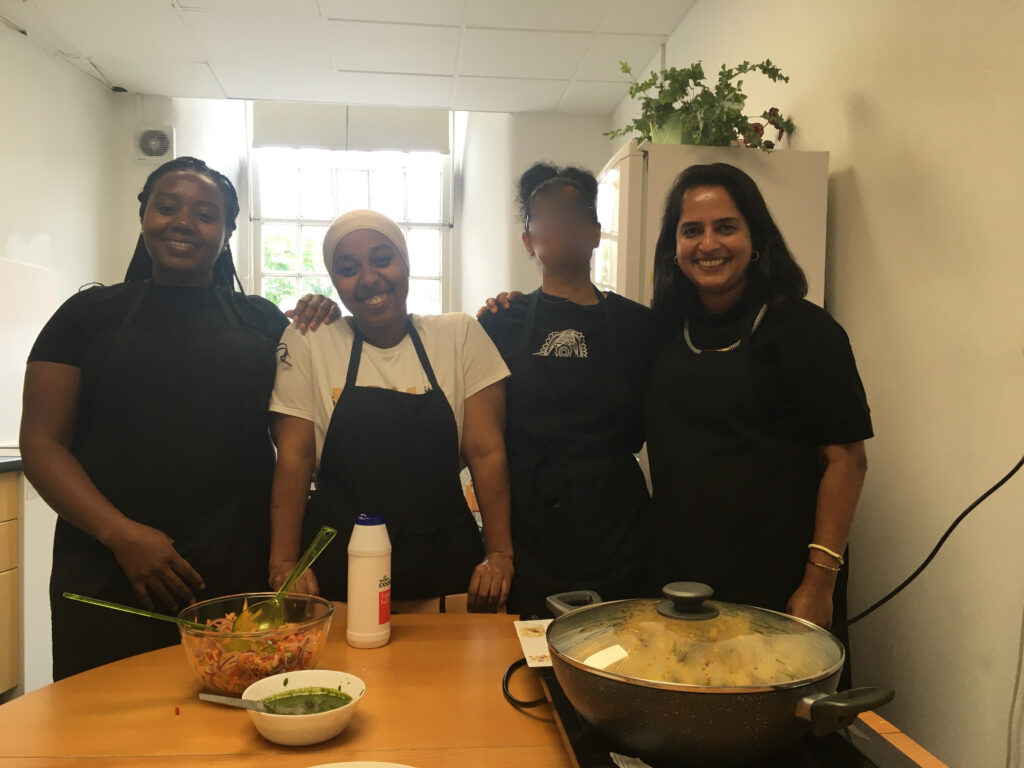
“I came into the charity broken, and it gives me a safe space and many things to heal myself.”
*Mary
Challenges and the way forward
We can feel the aroma, music and good energy from the kitchen radiating throughout the space. The food prepared is shared with non-participants who were first sceptical of trying different foods. Heritage and family stories come up as we support, listen and learn from each other. That has shown the true meaning of community.
During Refugee Week, the group shared a meal with other women from around Renfrewshire and shared insights and awareness about migrants, asylum seekers and refugee communities. It was interesting to see how much that information impacted the attendees.
Although the project brings many benefits for participants, there are still barriers to access. “I think for a lot of people who are going through the migration system in the UK, whether it’s an asylum claim or a visa application, it’s such a chaotic process and very intense, and I think sometimes it can stop people being able to do a lot of things they want to do.”, explained Annie.
“And attending to a group regularly is inaccessible because you have to go to the Home Office meetings, and this is too stressful in your mental health, like really suffering, so I think that has a significant impact.”
Annie explained that Kairos offers travel reimbursement, but people must have the cash to get a bus. “It’s a barrier because some people can’t afford to travel. If they’re on Asylum support, the bus tickets are your entire money for the day.”
Thaveshni explained that Kairos Kitchen’s plan is to grow the group, involve more women and provide them with skills to find jobs. They also want to support women with their asylum application on what is possible from their side, like writing support letters.
*Mary has been attending Kairos activities for a couple of years and is a member of Kairos Kitchen. When asked about how she feels, “I feel I am back home with my family”, she said.
She continued: “ I came into the charity broken, and it gives me a safe space and many things to heal myself; that’s the most important thing.”
Supporting migrant and BME communities to reconnect with the cultural and religious institutions familiar to them can assist them in maintaining their integrity while building a new identity in the receiving community.
Through these connections, they can access other essential integration resources such as employment, volunteering opportunities, and social network and participate in broader community activities.
Moreover, it helps them to heal from the cruel experiences of the immigration and asylum process and supports their well-being.
Kairos Kitchen chose food, but it might be crafts, music or sports. Giving someone a reason to step out of their thoughts and even leave their bed is a great help.
*The name was changed.
Learn more about Kairos Women+: https://kairoswomen.org/
This article is part of the project Mind the Health Gap, a year-long project developed by Greater Govanhill and The Ferret. The aim is to understand health inequalities in the country and how we solve them. Find more articles at: https://www.scottishbeacon.com/project/mind-the-health-gap/

Laura Ndanuko is from Kenya and has lived in the UK since 2018. She is a trainee journalist at Migrant Women Press.

